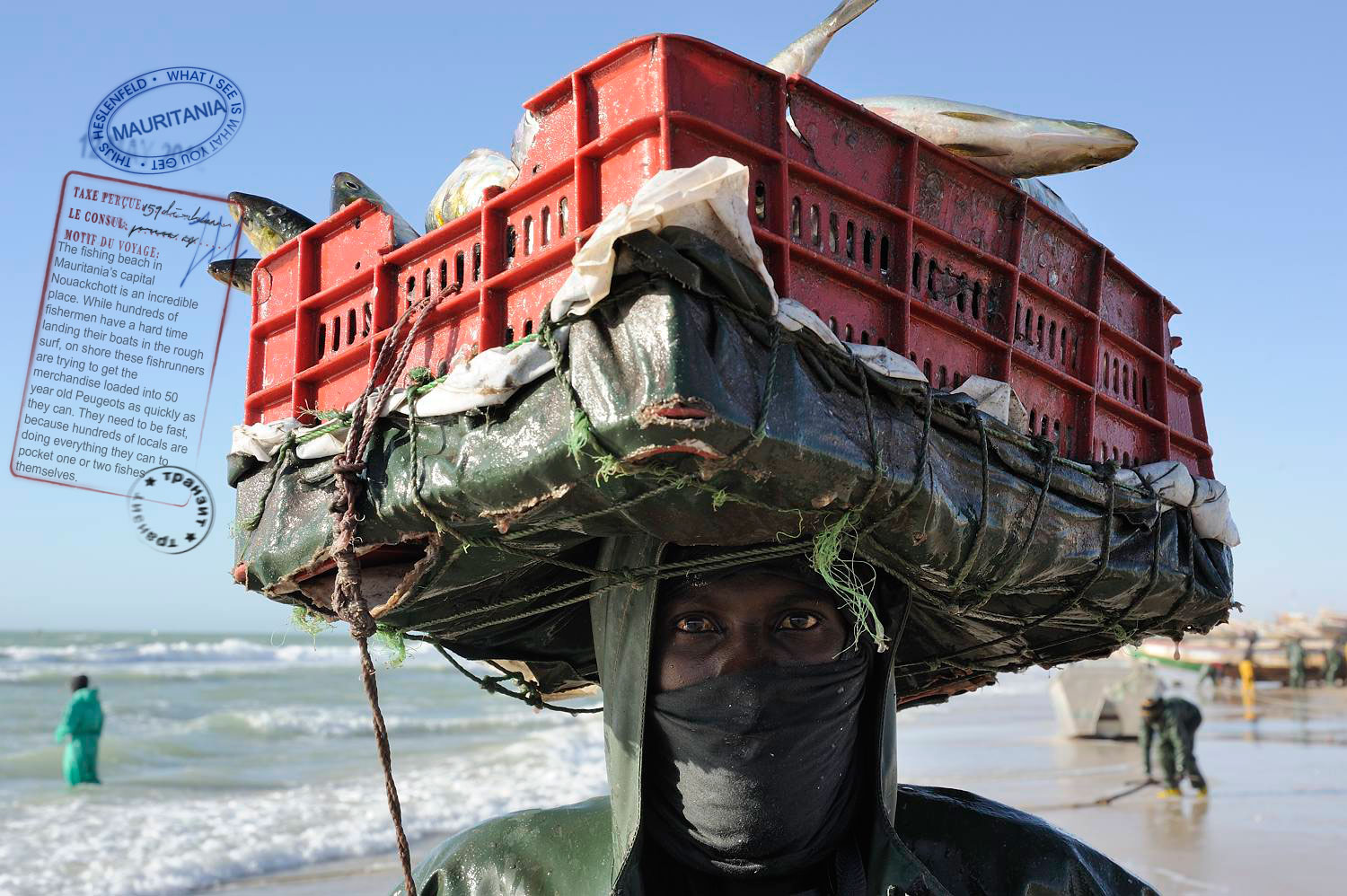






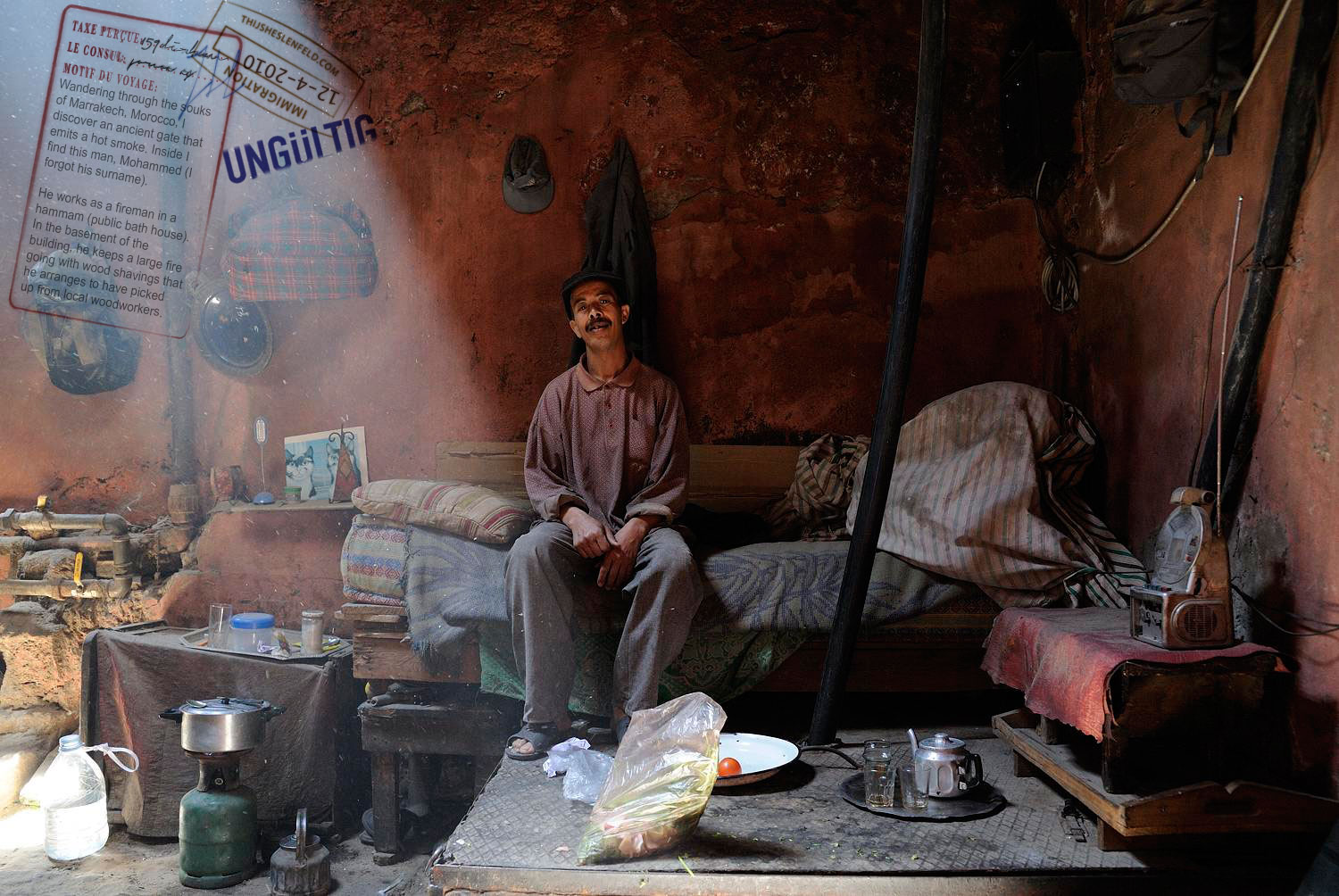






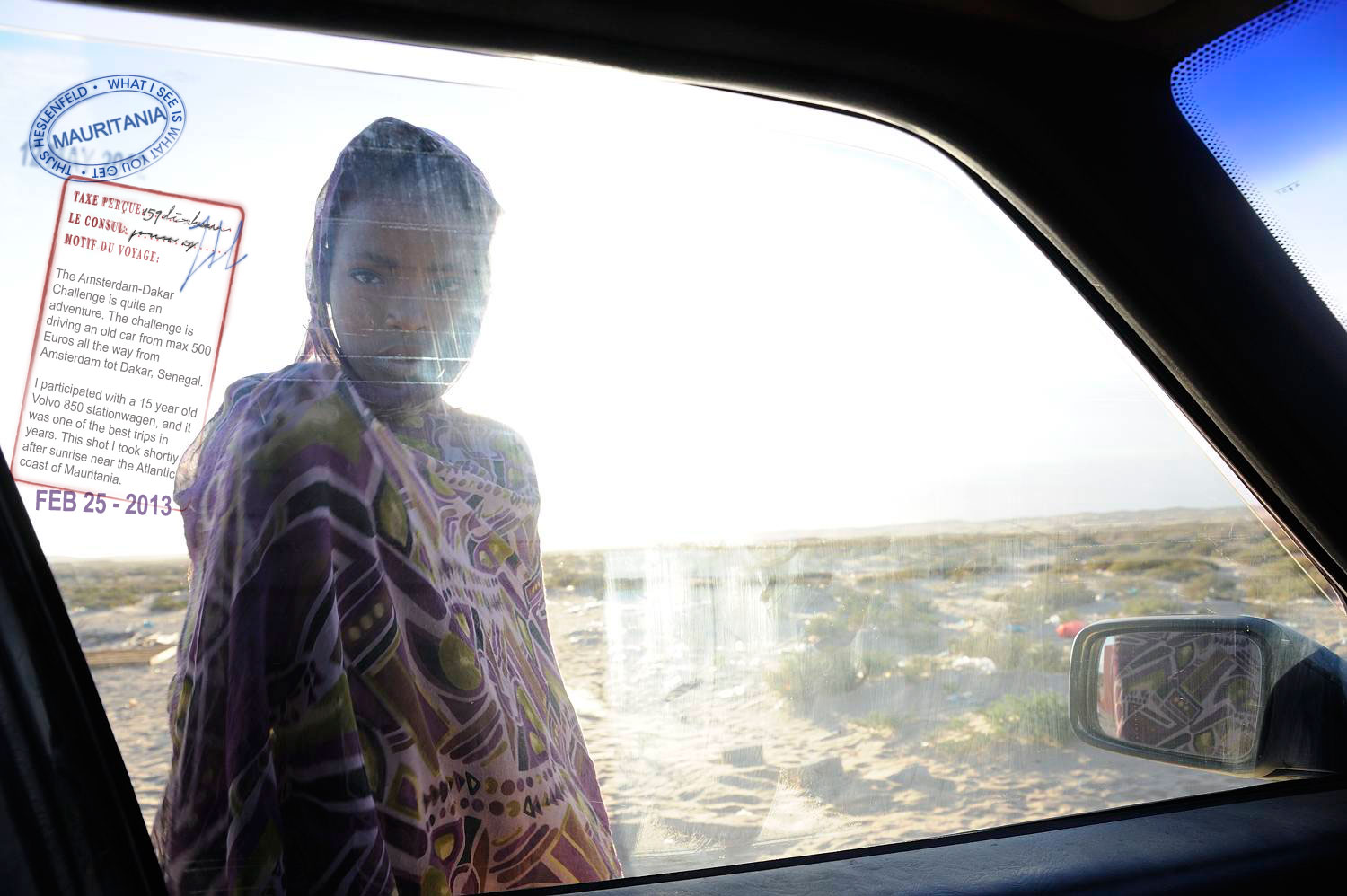
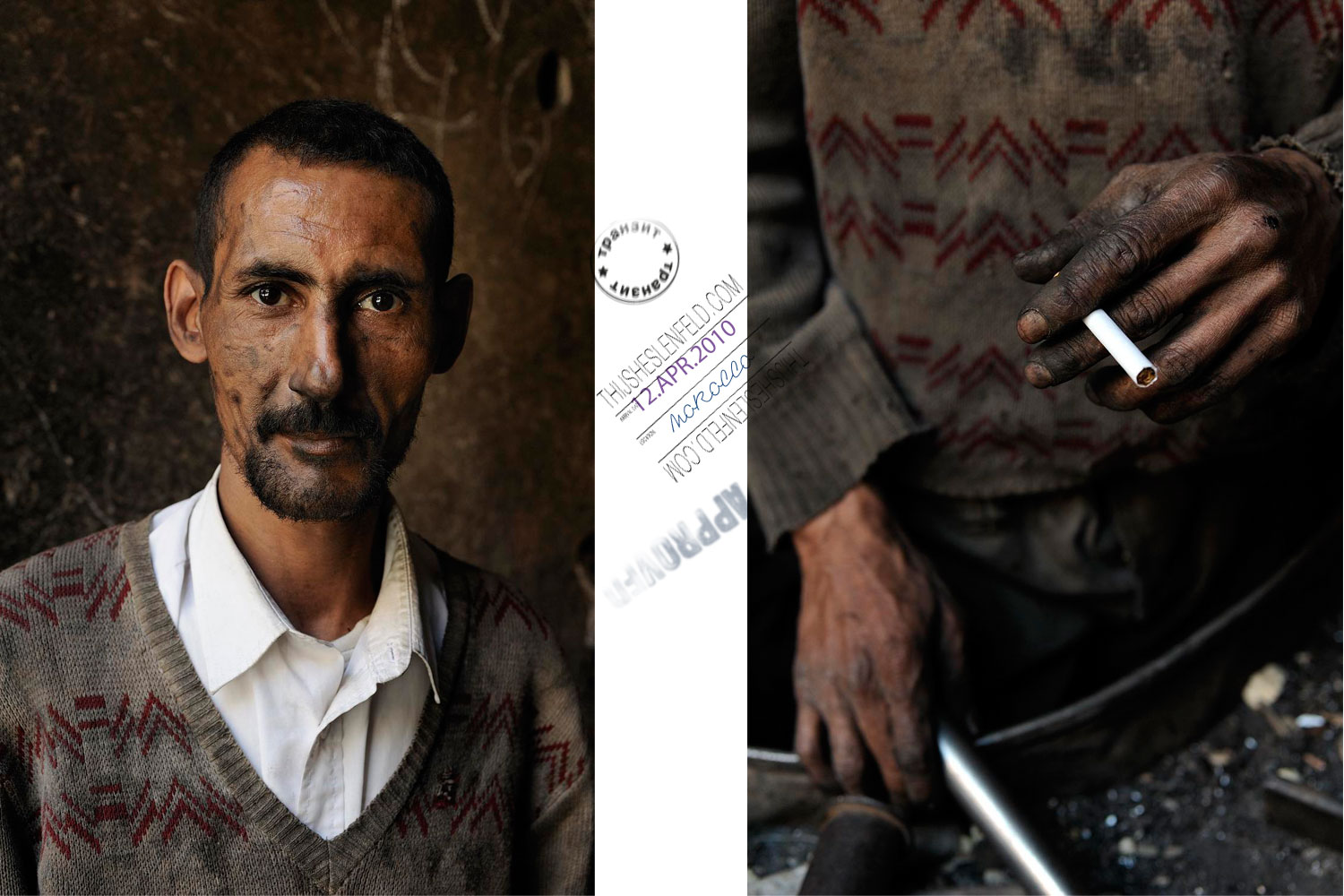
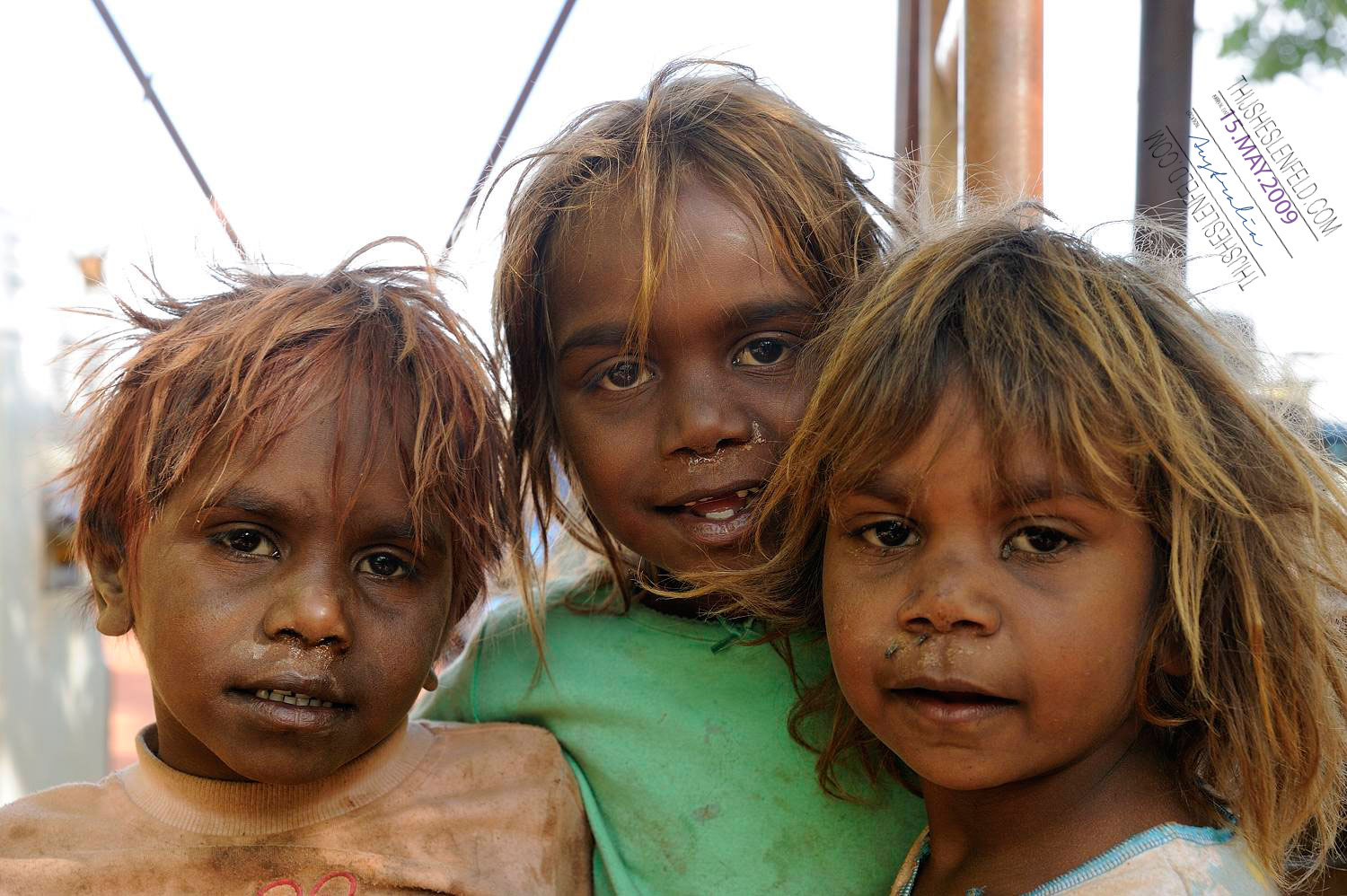
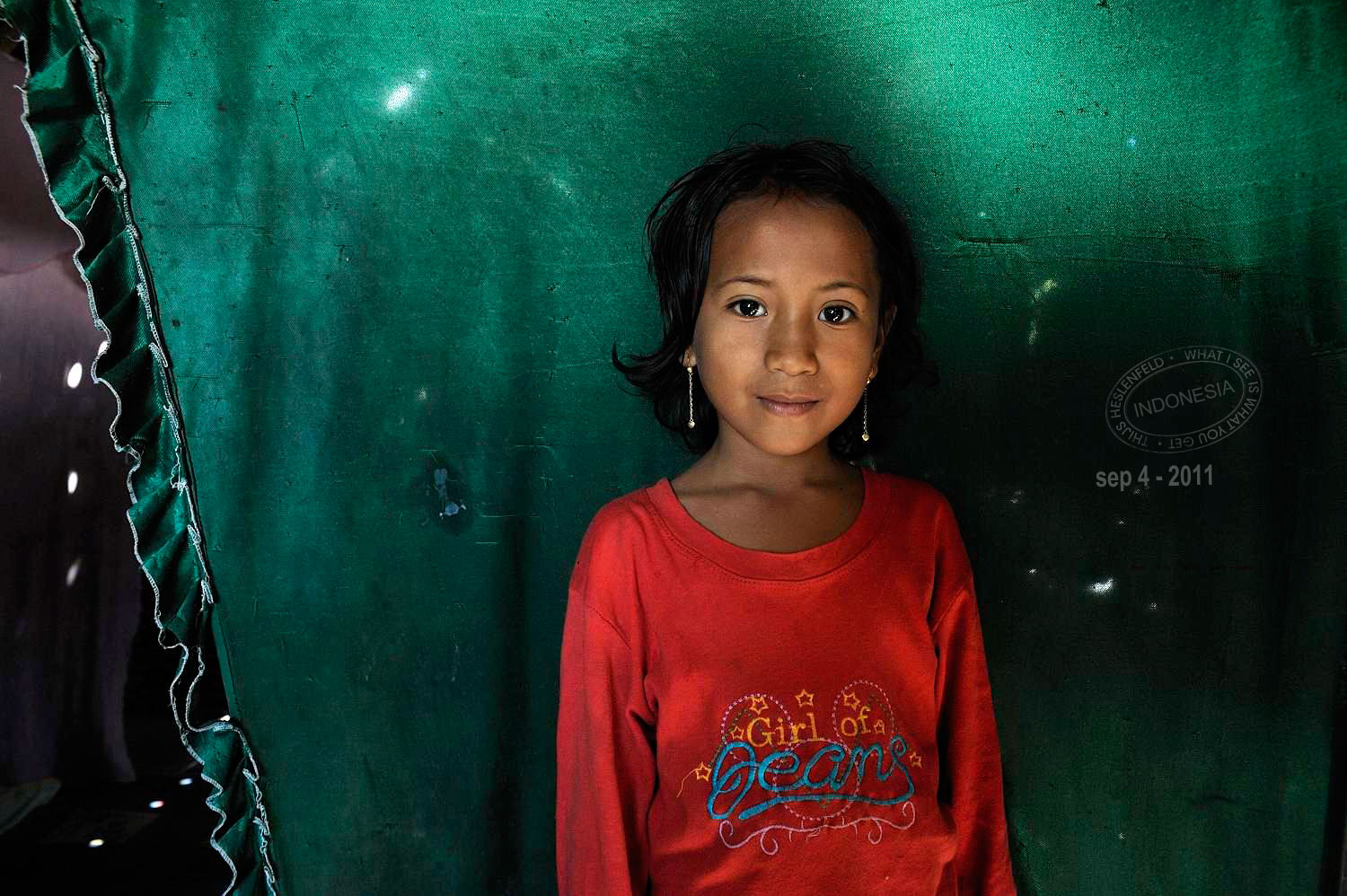

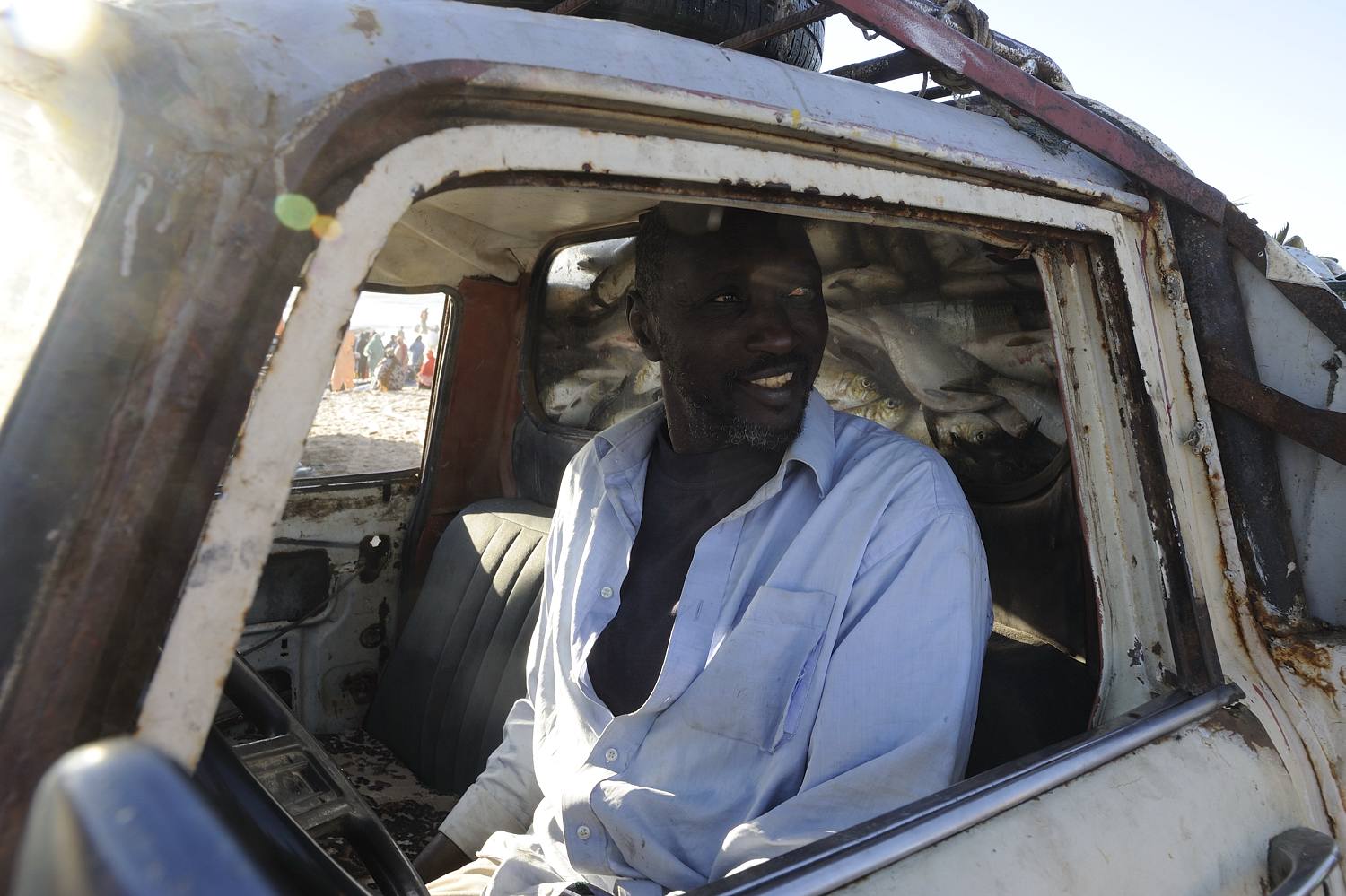

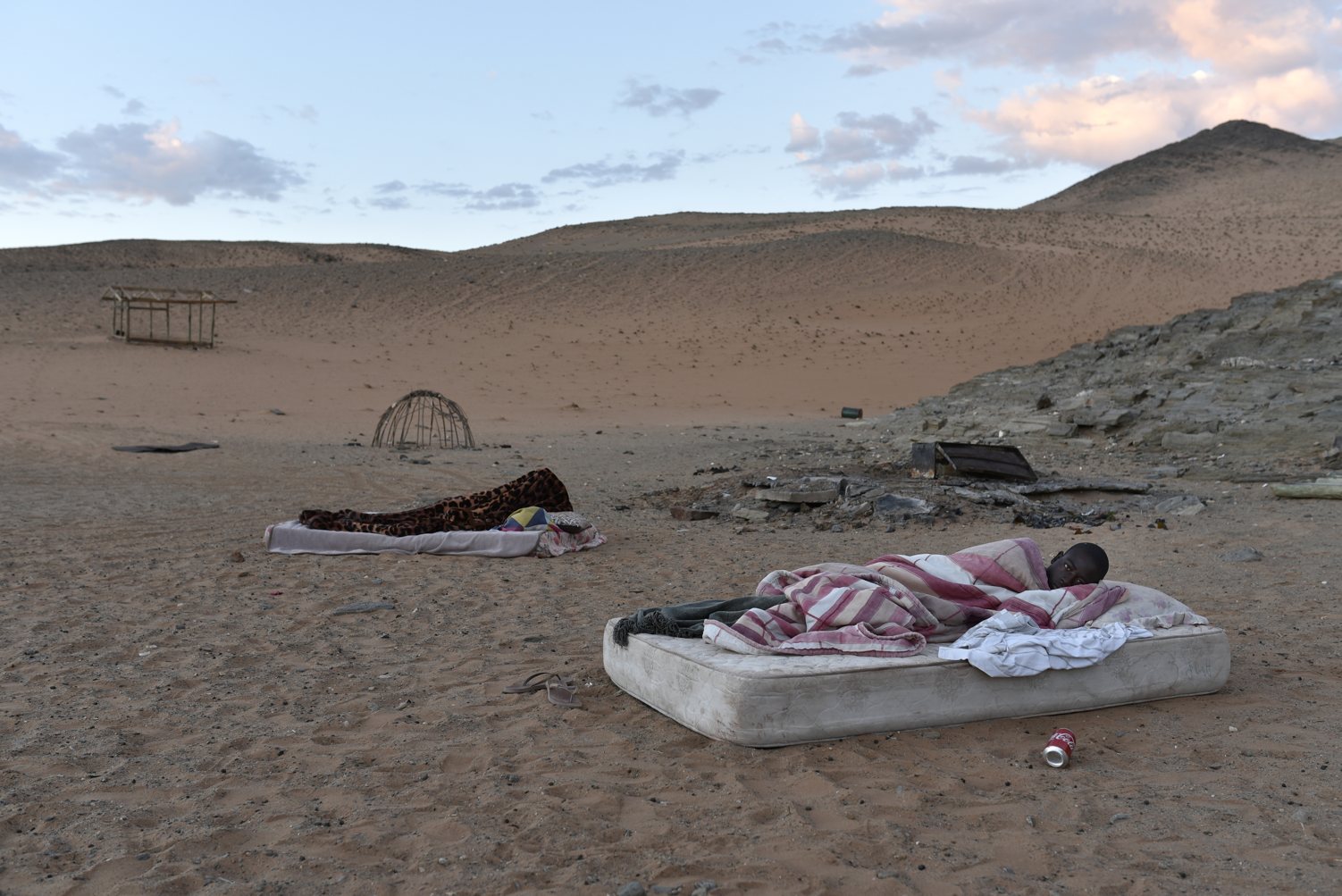
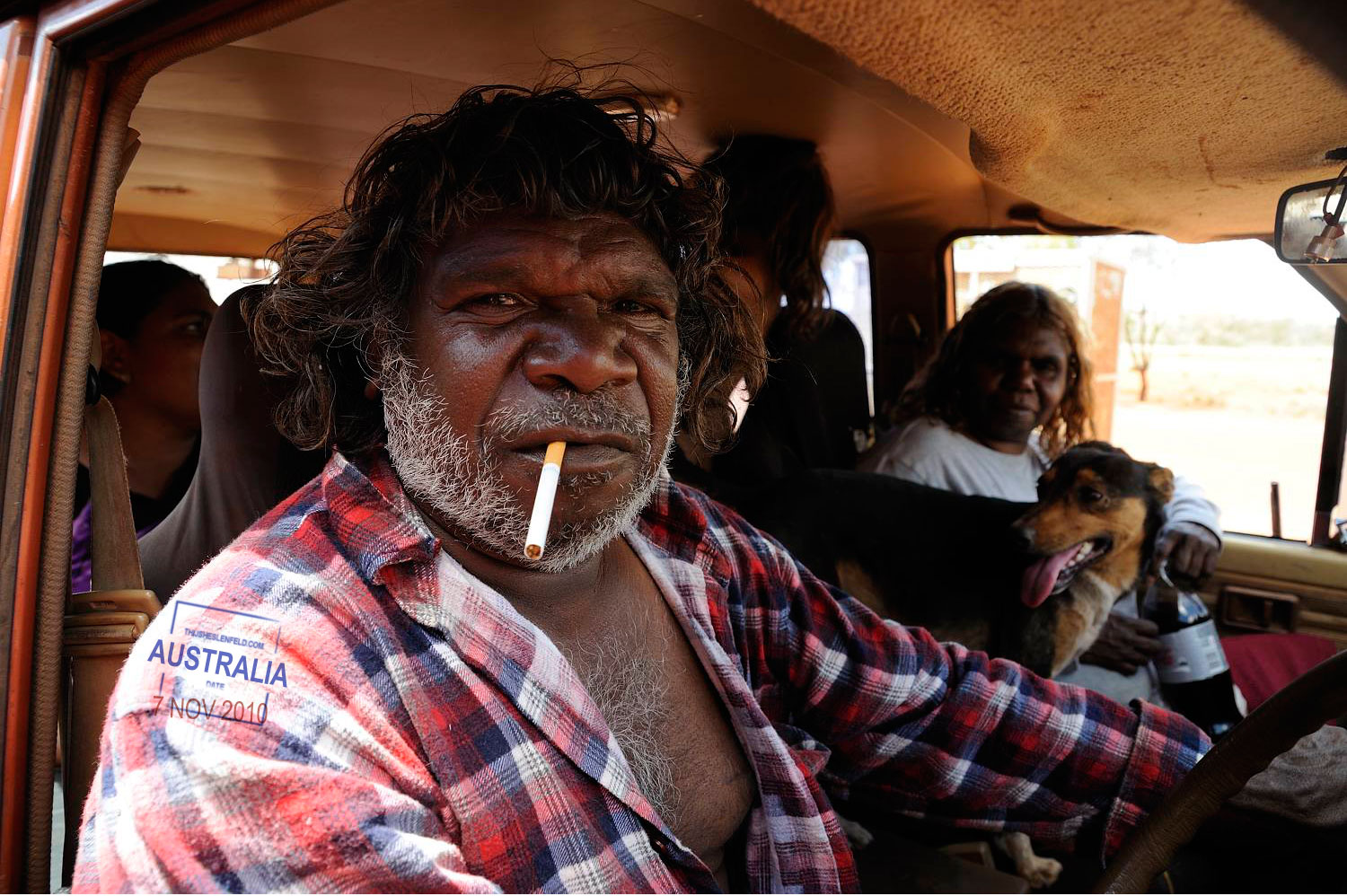

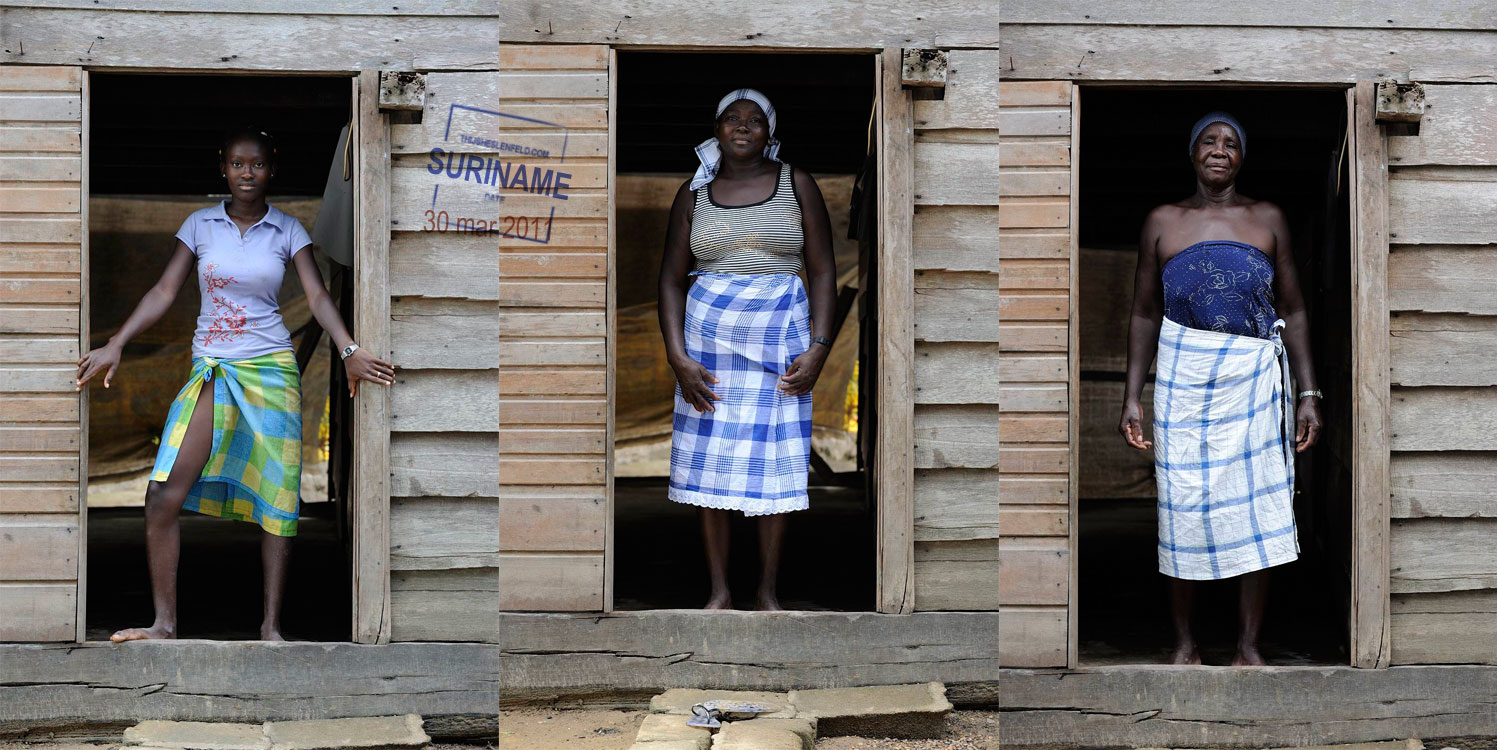
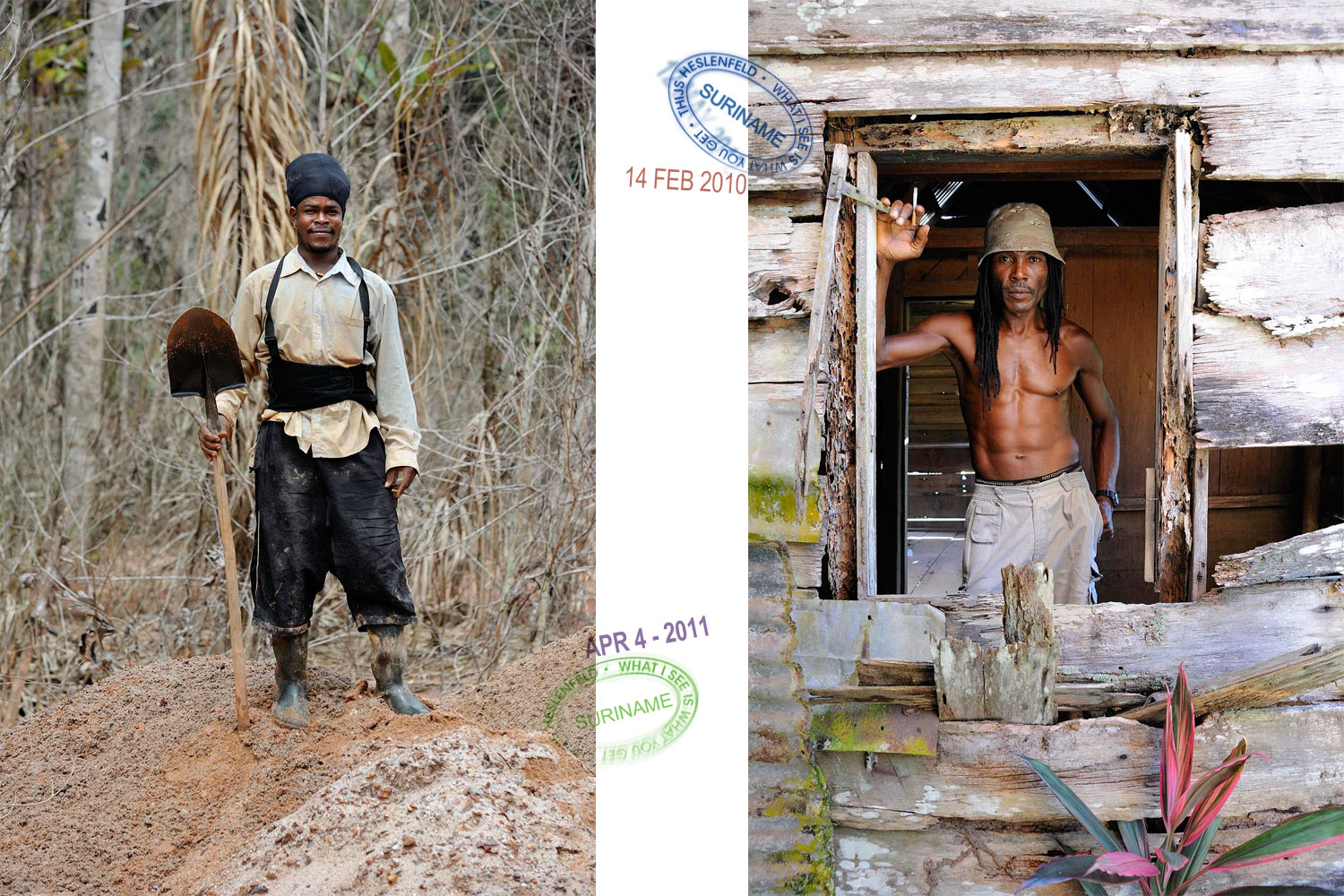
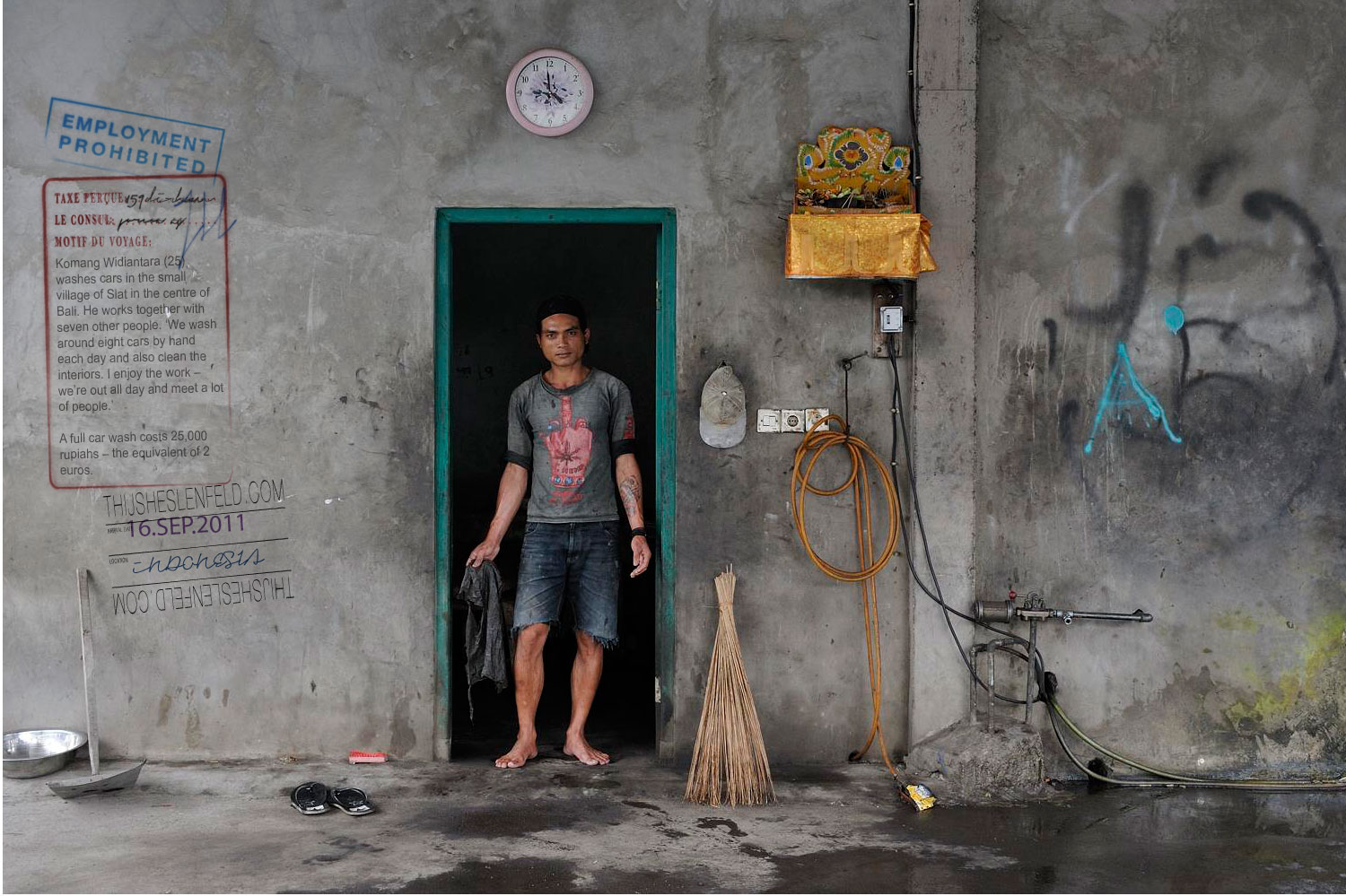

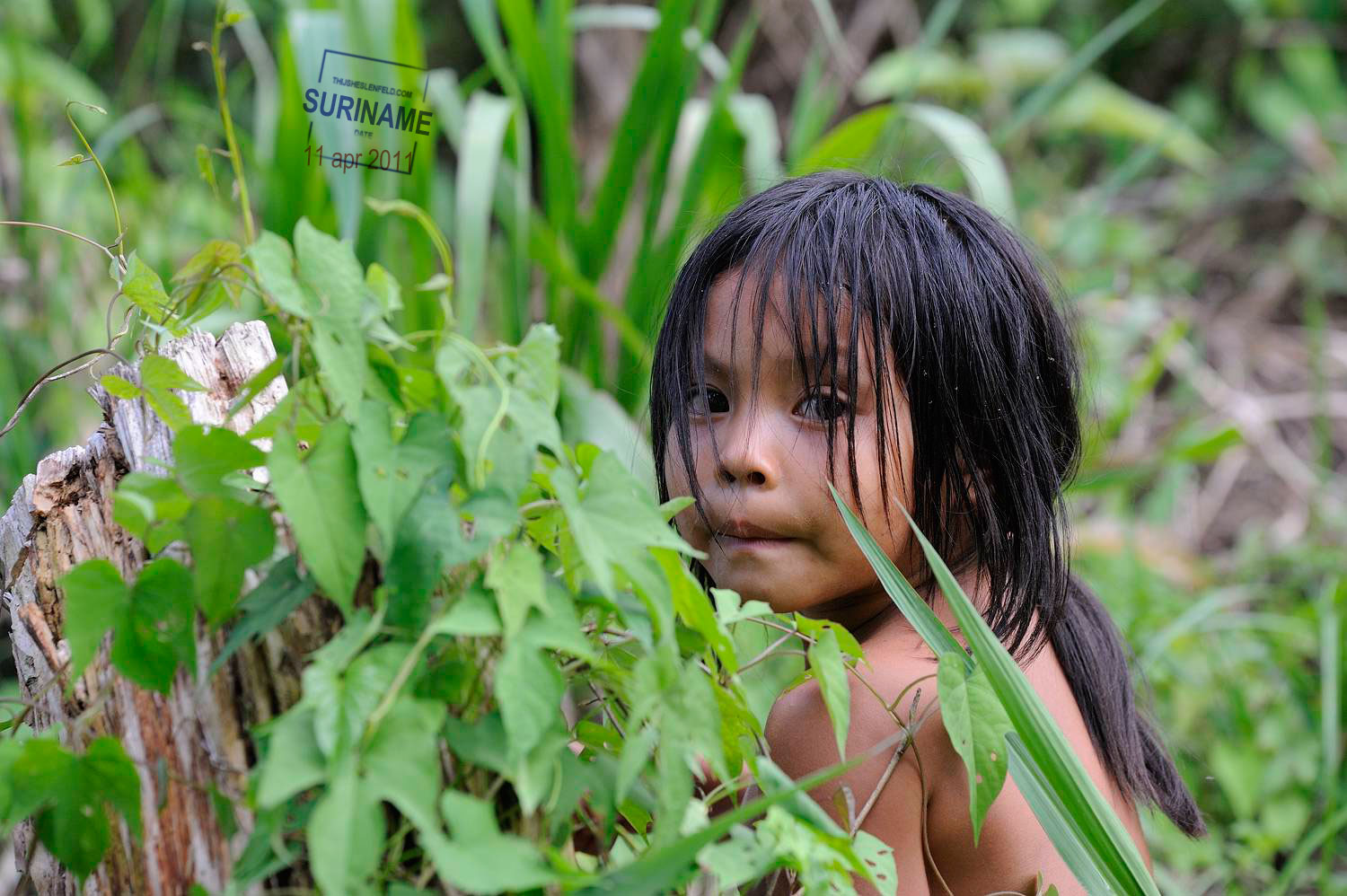
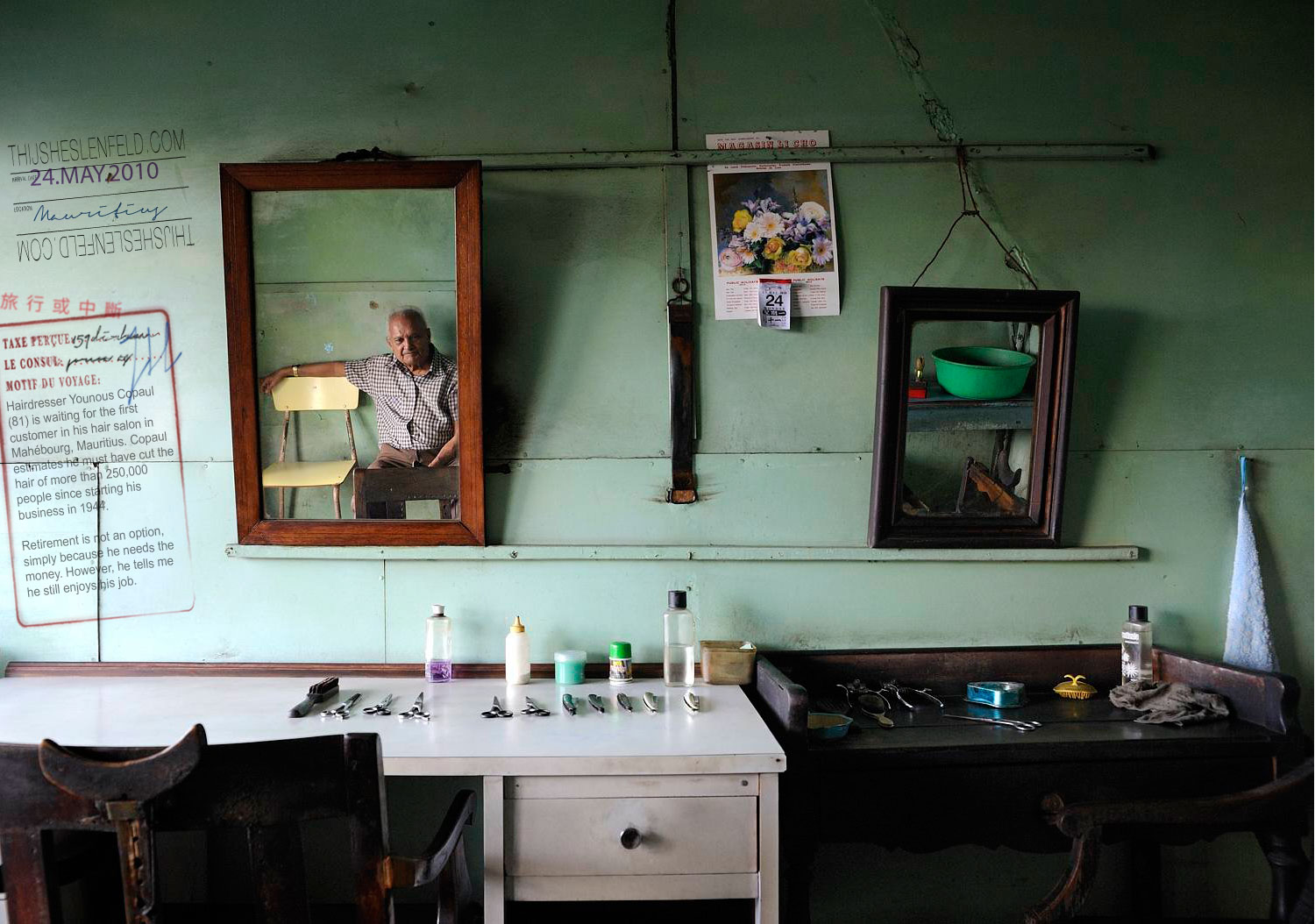
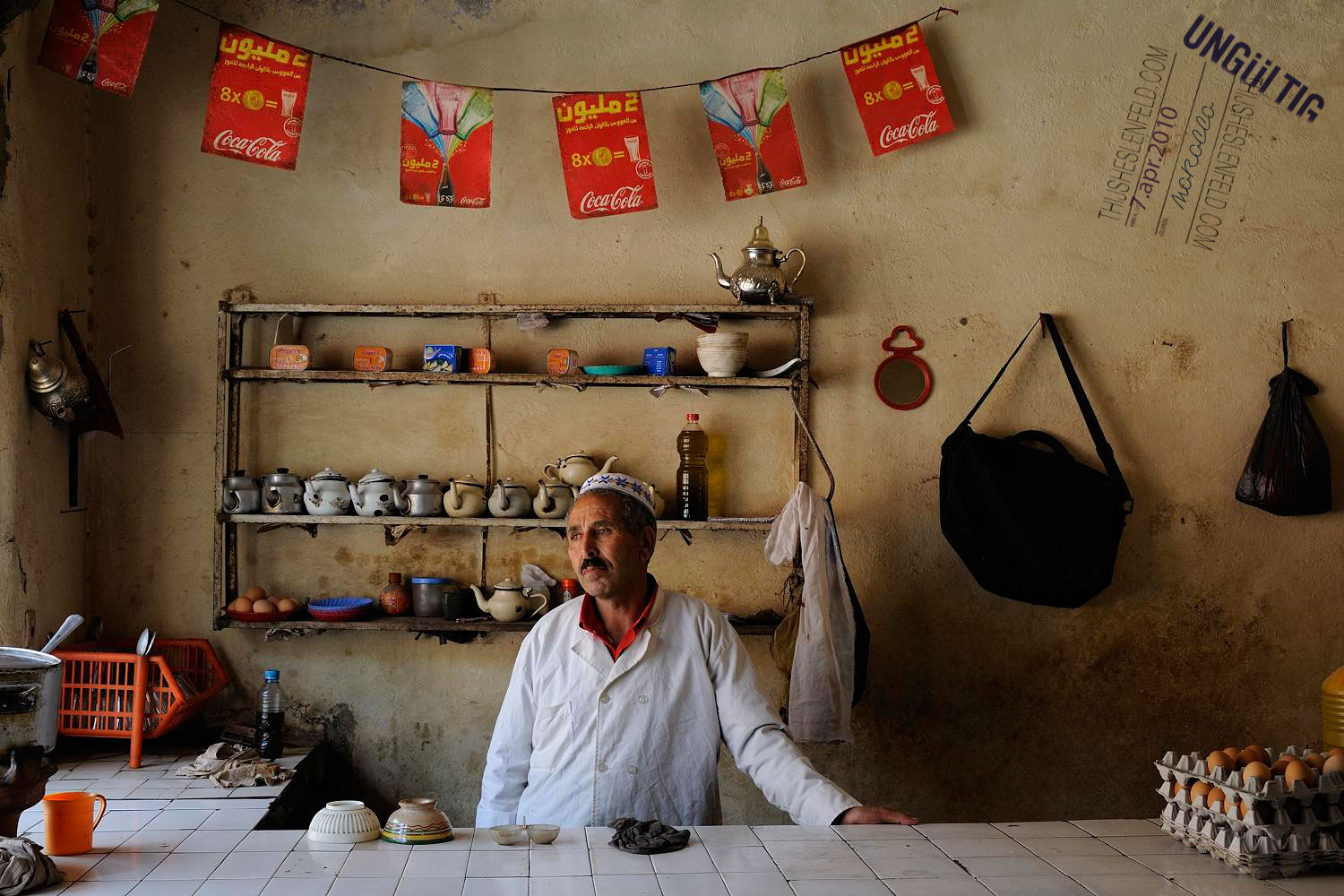
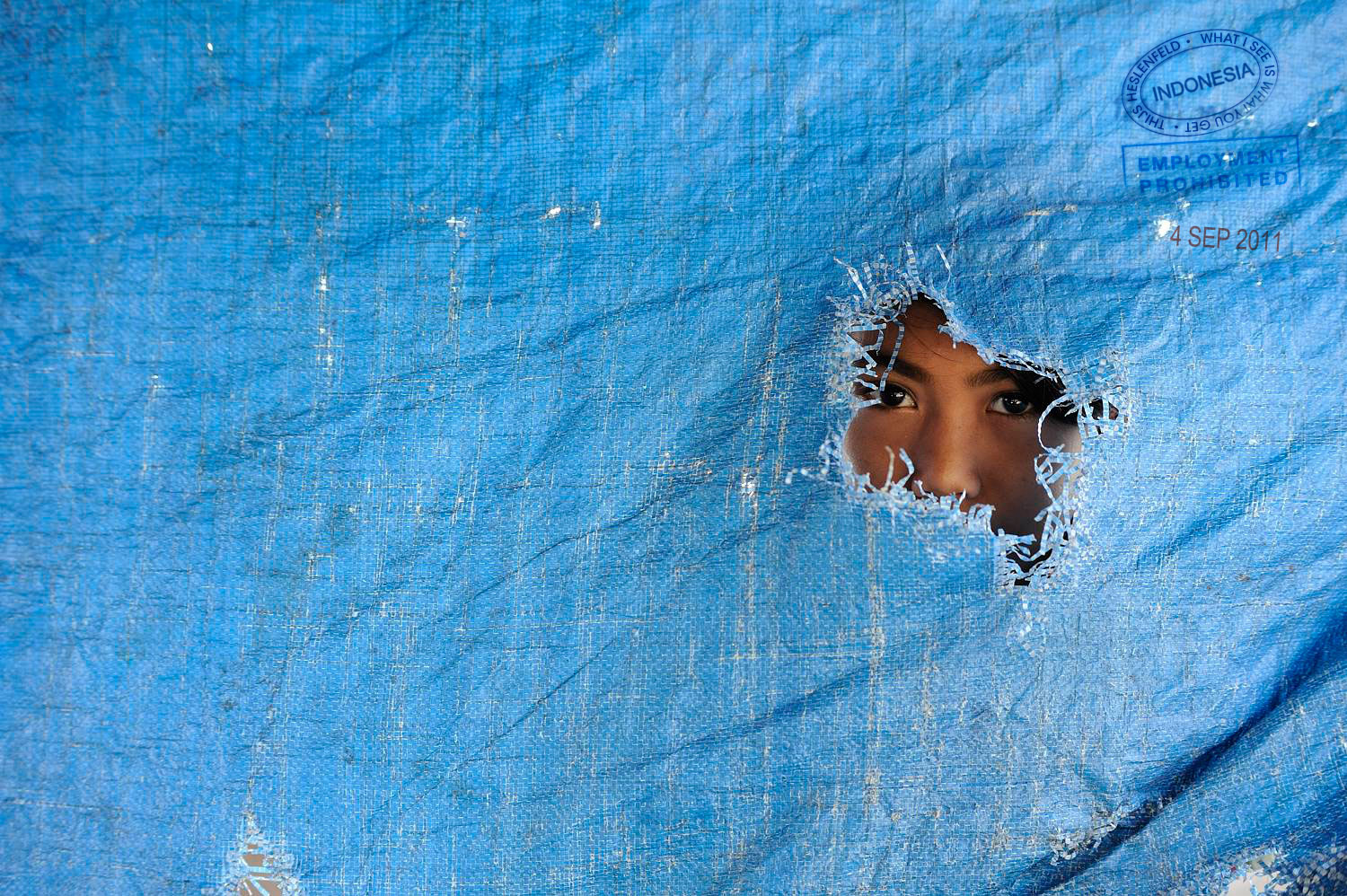
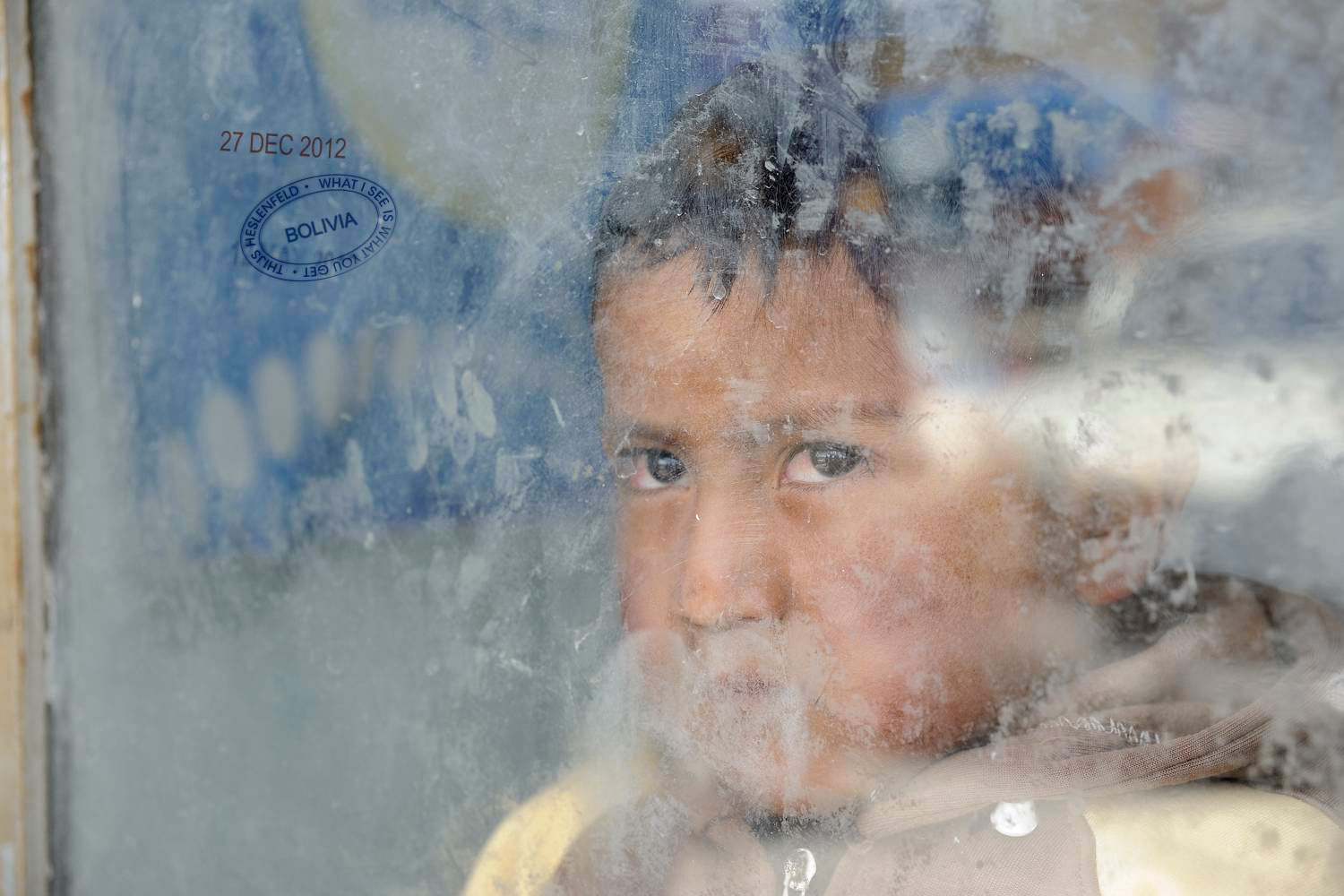
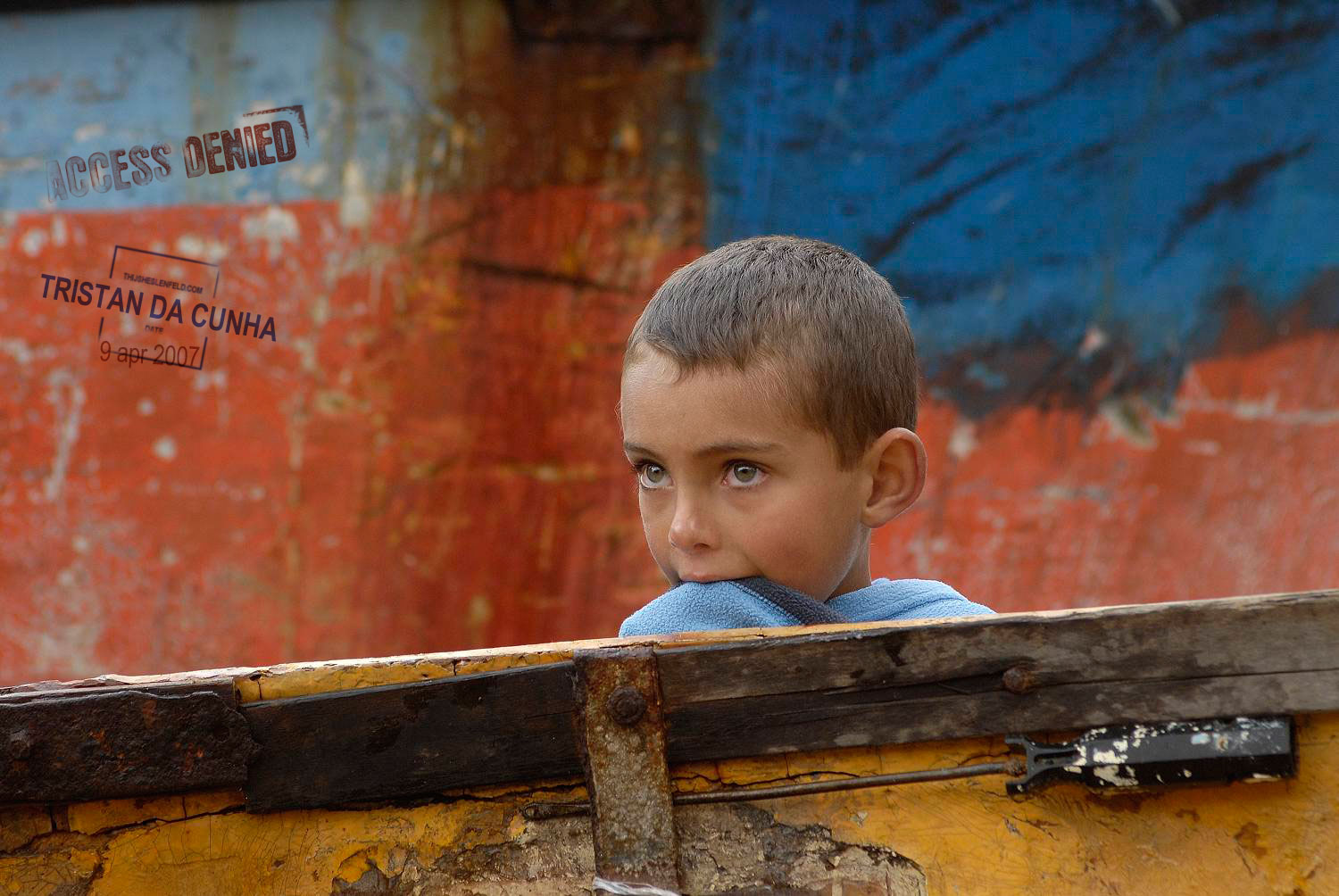
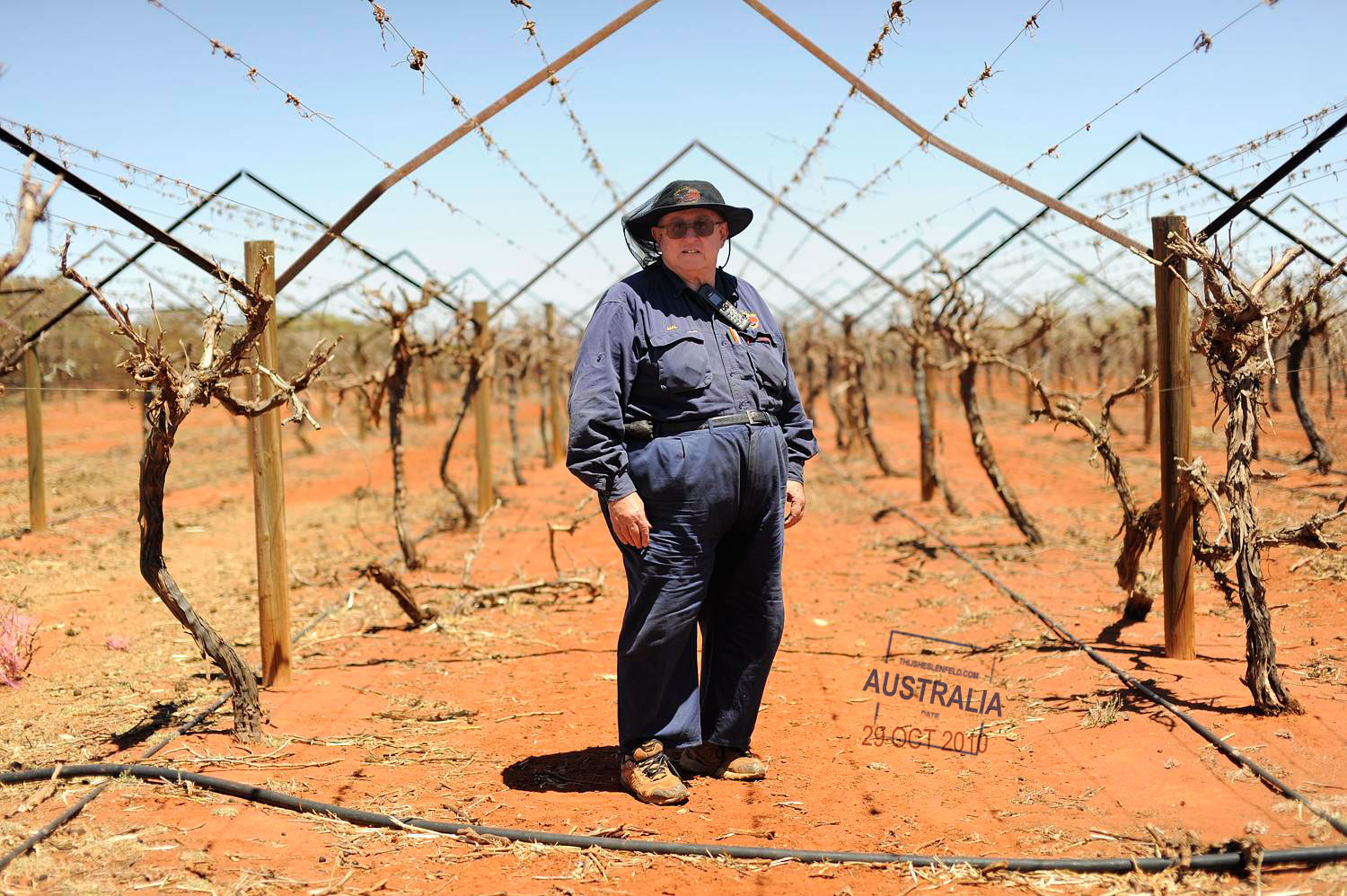
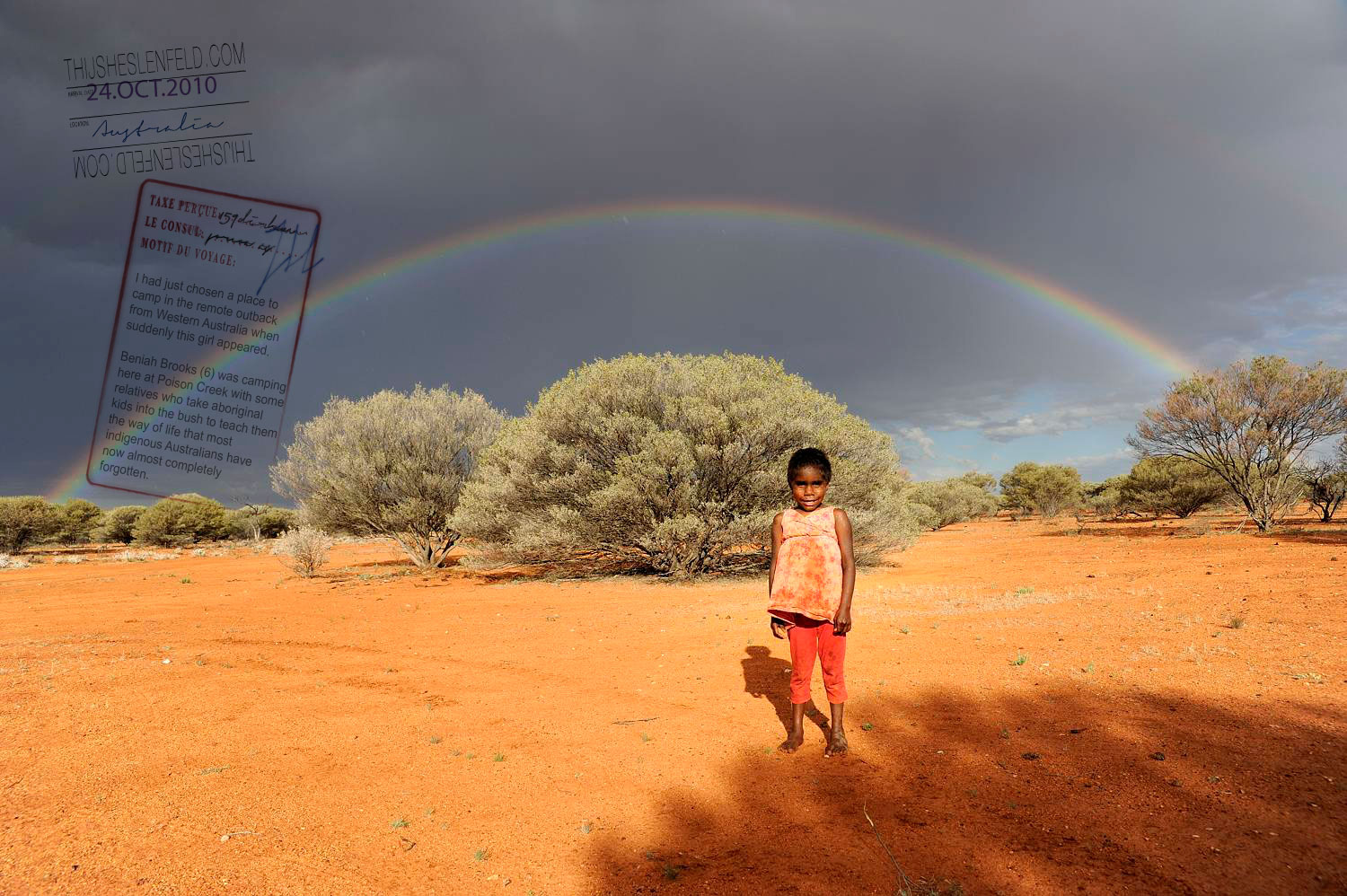
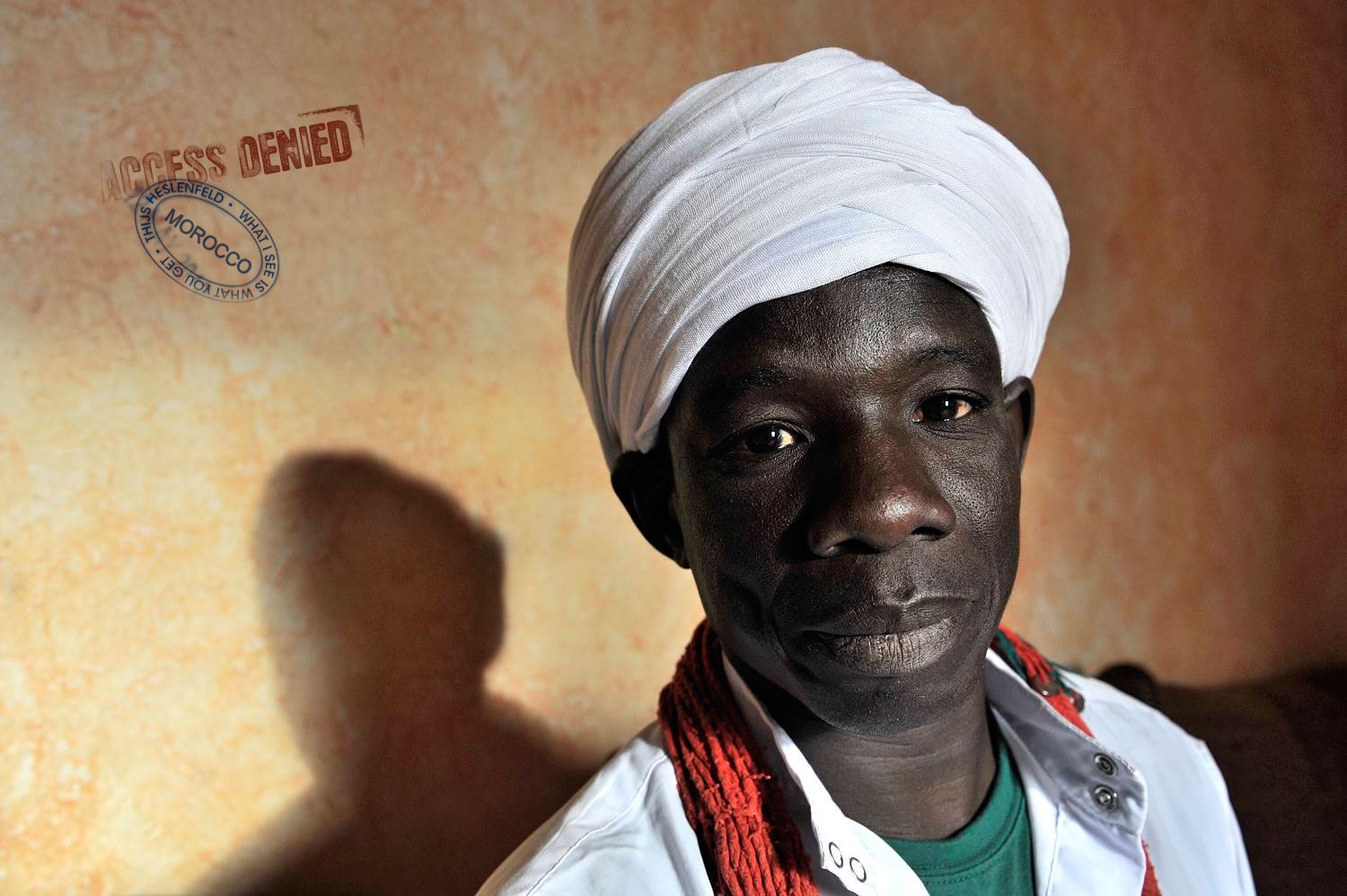
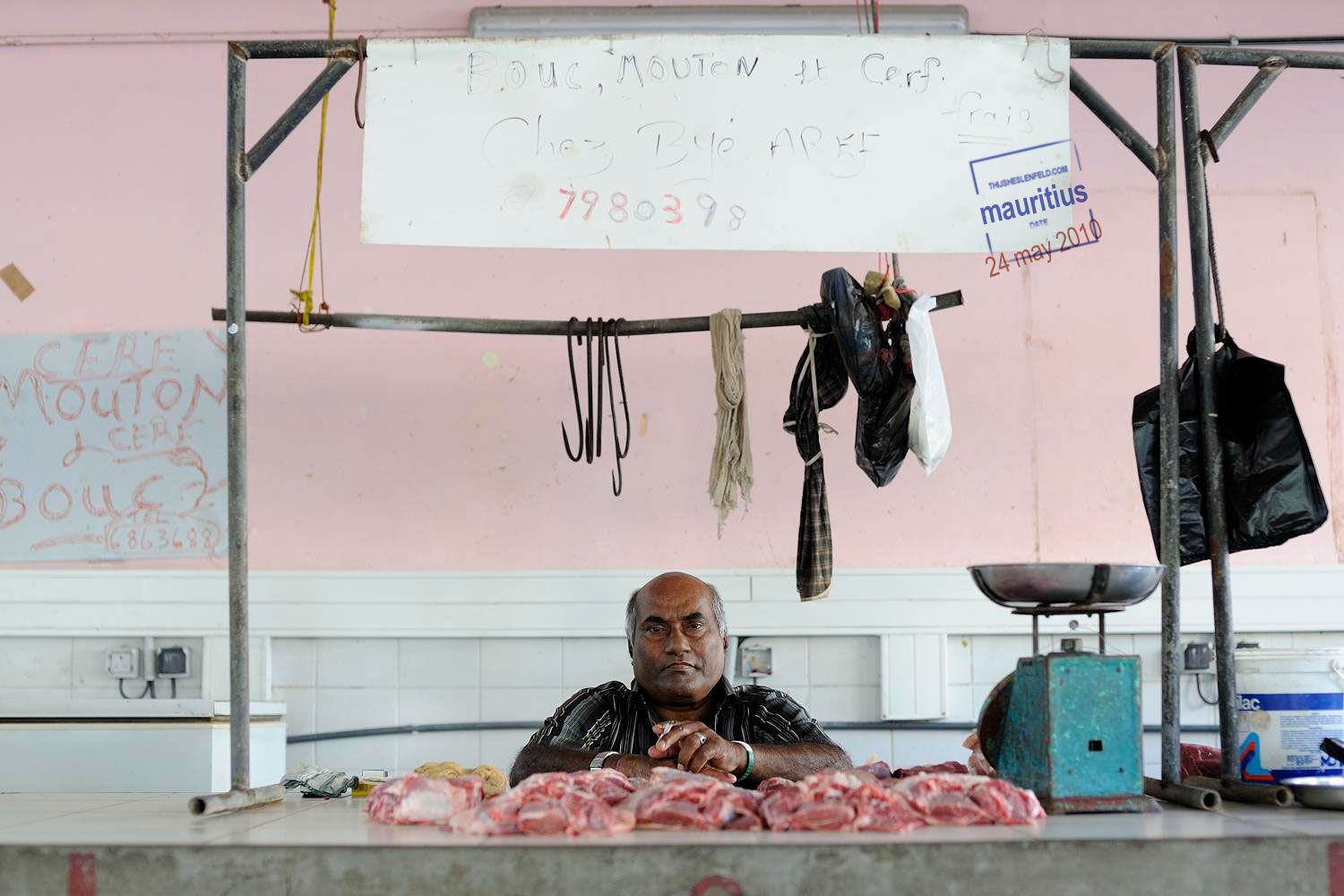
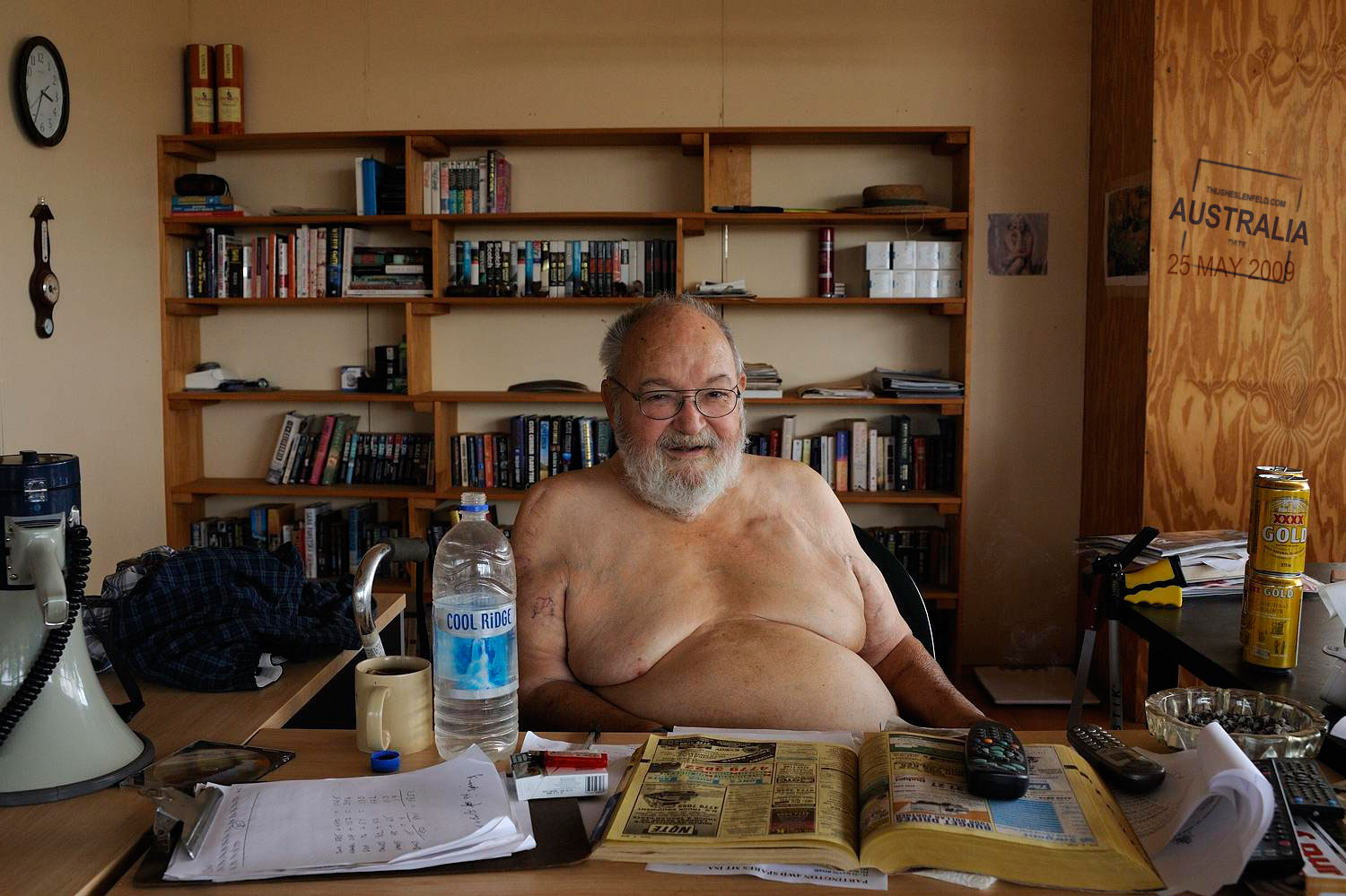
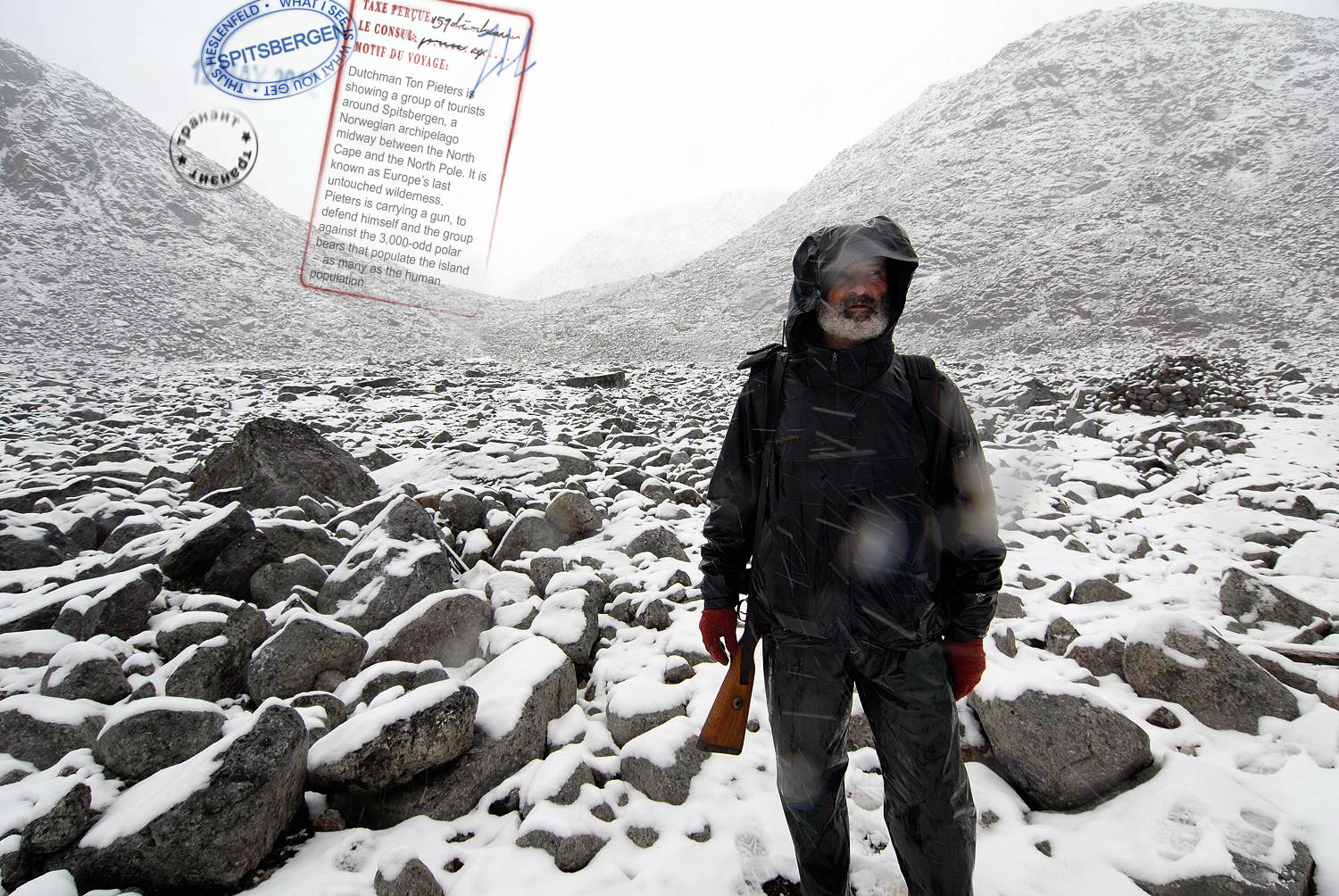
The fishing beach in Mauritania’s capital Nouakchott is an incredible place. While hundreds of fishermen have a hard time landing their boats in the rough surf, on shore these fishrunners are trying to get the merchandise loaded into 50 year old Peugeots as quickly as they can.
They need to be fast, because hundreds of locals are doing everything they can to pocket one or two fishes themselves. They will even snatch 'm out of these baskets, attacking from the back. Quite a hectic operation ;-)
Wandering through the souks of Marrakech, I discover an ancient gate that emits a hot smoke. Inside I find this man, Mohammed (I forgot his surname). He works as a fireman in a hammam (public bath house). In the basement of the building, he keeps a large fire going with wood shavings that he arranges to have picked up from local woodworkers.
His modest home is located at the top of the firehouse. That’s where I took this portrait. It is one of my favourite shots in 'Men at work'.
Milton Sanchez Vazques (28) works as a clown for the Peruvian Circo Gigante Chin Chin. The eight members of the circus have pitched their simple tent in a Lima slum. The circus performs only in these poor pueblos jóvenes or young towns. ‘That’s all we can afford. Besides, we feel at home here because the people who live here are just like us.’
Milton tells me it’s been a bad year for the circus. ‘Times are tough in Peru. People used to be willing to pay two or three soles for a little entertainment. But things are so bad right now that many families can’t even afford that.’
The circus tours all over Peru. Milton: 'The temperature in the tent must be comfortable. As soon as it gets too cold, people stop coming. That means our entire travel schedule is pretty much based around the seasons. Right now, we need to leave Lima, since it’s June and it’s starting to get too cold over here. It’s time to trek across the Andes, towards the Amazon.’
From the series 'Men at work'.
The Amsterdam-Dakar Challenge is quite an adventure. The challenge is driving an old car from max 500 Euros all the way from Amsterdam tot Dakar, Senegal.
I participated with a 15 year old Volvo 850 stationwagen, and it was one of the best trips in years. This shot I took shortly after sunrise near the Atlantic coast of Mauritania.
More info (in Dutch): amsterdamdakar.com
Marrakech is world-famous for the many souks in the old city centre. However, these markets have been affected by the growth of tourism. This effect is not nearly as strong in peripheral areas, such as the Bab El-Khemis Market, featuring mostly metal workers.
I meet this blacksmith just as he is taking a tea and cigarette break. Khalid and his colleague make all kinds of steel household objects, such as oil lamps and parts for these lamps.
He explains to me that he deliberately works in a dark room. ‘When you heat iron, it changes colour from red to orange to yellow, and finally to white. The ideal working temperature for us is right between orange and yellow. To be able to see the colours properly, we like to work in a dimly lit room.’
From the book 'Men at work'.
Three aboriginal kids at Rabbit Flat Roadhouse, along the famous Tanami Track in Northern Territory, Australia.
Over the past two decades I have many Souteast-Asian countries seen changing rapidly, losing a lot of their identity. That surely applies for the more crowded parts of Indonesia as well.
But the true beauty that I enjoyed so much when I travelled here for the first time twenty years ago can still be found in the more remote parts of the huge archipelago that Indonesia is. I photographed this girl in a small village on Komodi Island (yep, where the dragons live!), while on a sailing expedition with one of the lovely wooden schooners from Seatrek.
Engineer on a sisal plantation, Tanzania
Three generations of the Ceder family in front of their home.
Bergendal, Suriname
(LEFT) Laurens Garconius (29) arrived in the goldfields at Merian only a few weeks ago. He is now prospecting for golds together with his uncle and some other members of the family. Gold prospecting is a major threat to Suriname's unspoilt tropical rainforest.
I went to Merian to shoot for my photobook Au!
(RIGHT) Carlo ‘Kaatje’ Demidof (51) is an interesting character. He spent 20 years of his life as an illegal alien in the Netherlands. He was hooked on drugs and hanging around on Rotterdam’s Kruiskade. A few years ago, he decided to kick the habit and move back to his native Suriname. He now lives on the grounds of an old plantation where his ancestors once worked as slaves.
The plantation has been transformed into a modern resort. Carlo helps maintain the former slave quarters. He has also set up a small museum that displays all archaeological remains unearthed here in the past few years.
Kaatje tells me he is a happy man once again: ‘This is where I want to live and die.’
Komang Widiantara (25) washes cars in the small village of Slat in the centre of Bali. He works together with seven other people. ‘We wash around eight cars by hand each day and also clean the interiors. I enjoy the work – we’re out all day and meet a lot of people.’
A full car wash costs 25,000 rupiahs – the equivalent of 2 euros.
An indian girl in the town of Apoera, on the border with Guyana.
Hairdresser Younous Copaul (81) is waiting for the first customer in his hair salon in Mahébourg, Mauritius. Copaul estimates he must have cut the hair of more than 250,000 people since starting his business in 1944. Retirement is not an option, simply because he needs the money. However, he tells me he still enjoys his job.
I took the picture in May 2010, just when huge numbers of people took to the streets of Madrid, Paris and Athens to demonstrate against government plans to raise the retirement age. EU statistics show that the average age of retirement in Greece is 61, while in France it is 59.4.
Ahmed Zahir (50) is getting ready for a new day at his restaurant in Zarkian Agballu, located in the mountains east of Marrakech. Ahmed has been running his joint for more than 30 years. His most popular dishes are his tagines and couscous. Naturally, his customers also drink many litres of tea a day.
Mando Lavarello lives on Tristan da Cunha, the most remote inhabited island in the world. Tristan lies in the middle of the Atlantic Ocean, right between Argentina and South Africa. There is no airport and no harbour: the only way to land her is with a small dingy from ships anchored next to the island. And this can only be done once every 3 or 4 days..
If you're planning to go there, you might want to postpone your visit. A total solar eclipse will pass over the island on 5 December 2048.
Before embarking on this adventure, Malcolm had collected all the available meteorological data for the past 100 years. He intended to use these as a basis for predicting patterns in rainfall in the Wiluna area. ‘It turned out that the rainfall here was completely unpredictable. Nobody knows when it’s coming, and nobody knows how much will fall. And it’s very local. Sometimes we get nothing at all, while they could be having a 60-minute downpour just 10 kilometres from here.’
To support themselves, Malcolm and his wife now rent out the simple rooms originally intended for grape pickers and other seasonal workers. Their initiative has been successful. People travelling from the extremely isolated Gunbarrel Road, in particular, jump at the chance to sleep in a real bed in an air-conditioned room for the night.
Malcolm is a sensitive man. He talks about literature and expressively recites a poem about the beauty of life in the Outback, with tears in his eyes. ‘This poem so perfectly describes the blistering heat of a summer day in this area. The sultriness and the total stillness, with maybe just a hint of a slight breeze. I love it!’
I had just chosen a place to camp in the remote outback from Western Australia when suddenly this girl appeared.
Beniah Brooks (6) was camping here at Poison Creek with some relatives who take aboriginal kids into the bush to teach them the way of life that most indigenous Australians have now almost completely forgotten.
Merzouga in the east of Morocco attracts a lot of tourists because it has some spectacular Sahara sanddunes. The place is pretty touristed, but still has a nice atmosphere. In one of the local guesthouses I met this musician.
This man sells meat at the Mahébourg market. His self-assured, stoic demeanour catches my eye. When I take the photograph I don’t have time to have a chat, so I don’t actually find out anything else about him.
US native Alex Chapple (81) is the eccentric owner of the remote Calvert Hills Station, which he runs together with his daughter Kit (55). A recent heart attack hasn’t stopped him from his daily habit of knocking back 12 cans of beer and smoking 3 packs of Winfield cigarettes. ‘But they’re Ultra Lights, you know – the only brand that lets you experience the taste of paper!'
Calvert Hills is a massive cattle station covering more than one million acres and housing 15,000 to 18,000 cows. Although Highway 1 is not too far away, this is still a remote place. You can drive for hours on this gravel road without running into another soul. The nearest petrol station is 200 kilometres away.
This is not Alex’s only business – he also owns a citrus farm in California, where he spends half of the year. Alex is a self-confessed ‘Club Med addict’: ‘I’ve been to 41 already and we’ll be going to Mexico soon for number 42.’
Dutchman Ton Pieters is showing a group of tourists around Spitsbergen, a Norwegian archipelago midway between the North Cape and the North Pole. It is known as Europe’s last untouched wilderness. Pieters is carrying a gun, to defend himself and the group against the 3,000-odd polar bears that populate the island – as many as the human population.
Their presence means that anyone who ventures off the beaten track outside the small capital city of Longyearbyen must be prepared for an attack at all times. When not employed as a tour guide, Pieters works as a forester for the National Forest Service in the Netherlands. He has been in his job for 40 years.